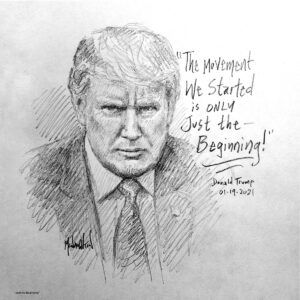Solving Problems
Is what People do, Not Politicians
JB Williams
©2007 USA
I’m forty seven years old. Ronald Reagan was the first president I was old enough to vote for and it was an easy decision after a disastrous Jimmy Carter era. Reagan talked about solving our immigration woes, fixing a broken Social Security system, strengthening our military and national security, dealing with the evil empires of the world, which threatened our peace and prosperity, re-building traditional family values and returning America to its core principles of freedom, personal liberty and personal responsibility.
Twenty six years later, politicians have solved none of these issues and a record number of presidential candidates are once again crisscrossing the nation, promising to deal with all the same issues politicians have been promising to solve for as long as I can remember.
Since I cast my first vote for President Reagan, our immigration problems have gotten worse, Social Security has been plundered into insolvency, our national security is a shambles with terror sleeper cells living next door, and we have more evil empires taking aim at America than ever before in history.
Both Democrats and Republicans have held power, in congress and in the White House over the last twenty six years, and none of them have solved any of the problems people elected them to solve. Yet here we are again, listening to the same old campaign promises from the same old career politicians and lining up behind candidates as if we actually believe that any politician is really going to solve any problem. Fool me once, shame on you – twice, shame on me, but for twenty six years in a row, that’s got to be some kind of new record for gross ignorance, doesn’t it? This makes the people in Jones Town look like independent thinkers!
Our Republican President has about a 30% approval rating. Our Democrat congress is even worse, holding at around a 20% approval rating. We elected them… Yet American voters are brandishing campaign signs as if they really believe politicians can or will solve anything. Hope is one thing, but blind faith in politicians is not supported by their long track record of solving nothing.
The People will solve the problemsThe people are responsible for the political mess we have today. We elect these politicians and then return to our daily routines as if we’ve done our part and the rest is up to the elitist intellectual do-nothings we just elected. What we see today is nothing more than the natural results of absentee management. We’ve been too busy with life to run our own country, so we’ve left it in the hands of politicians who have no track record of solving anything, other than their personal financial wellbeing.
Once Americans become convinced that a problem is severe enough to demand immediate attention, they step up and solve the problem themselves. Congress and the president recently tried to legalize illegal immigration as a means of solving the illegal immigration problem. Only when the American people became convinced that the problem demanded their immediate attention, did they step in and set Washington on the right track towards secured borders and a sane immigration policy.
The most creative productive people on earthWhen it comes to getting things done, no society on earth can hold a candle to Americans. Over and over throughout history, Americans have stepped forward to solve seemingly unsolvable problems, both at home and abroad. It’s the people who get things done in America, not the politicians and its high time voters remember this…
The only problem the American people can’t solve, is the useless, lying, backstabbing politician problem (this is what politicians do)
We know that our tax system is oppressive and insane. When we get sick of it, we’ll fix it. We know that our federal government has strayed into a socialist abyss, sapping more and more resources (freedom) from the private sector by promising more and more gifts from the federal treasury. When we get sick of it, we’ll fix that too. What politician is going to fix any of it when it profits politicians both monetarily and in terms of power, to keep the problems intact?
Hillary’s Socialized Medicine – A good example of making a problem worse, just to benefit politicians aloneHillary Clinton just rolled out her Socialized Medicine plan again. Most Americans would never knowingly vote for socialism, not in their medical system or anywhere else. So why is the Democrat front-runner so convinced that rolling out an already failed plan for socialized medicine will win her the White House in ’08?
That’s easy! She believes that enough American voters are stupid enough to vote for socialized medicine today, so long as she calls it “Universal Health Care”, that’s why. Her plan has a $110 BILLION price tag attached to it, by her own accounting, which means it will cost more like five times that amount once Washington is done with it. That’s $110 BILLION (a trillion once installed) more than the federal government is already spending and it’s been spending red ink into the future as far as the eye can see already.
Yes Hillary, let us vote for certain national bankruptcy and yes, will congress please be my doctor? Are you kidding me? If Americans will vote for this, we don’t need health care at all because we’re already brain dead!
Our health care system is something than can be fixed without replacing it with a federal socialist medical system. It requires increased free market competition, not a federal health care monopoly run by politicians. The last thing we need is the same people running health care that ran Social Security into the ground.
Fixing Social Security means Replacing Social Security FDR’s New Deal became a Raw Deal before the ink was dry. The Social Security System was never designed to be a retirement plan. It was designed only to be a crisis security net and a supplemental paid-for entitlement that might give seniors a little added comfort and security in their golden years.
But after the fed took half of your life’s earnings in taxes, folks think they are due at least what they paid in over the years and why not? Had the federal government done a reasonable job of managing and investing the Social Security Trust Fund over the years, retirement would be secure for everyone. But surprise – surprise, the federal government, our politicians, not only failed to manage the fund well, they PLUNDERED it into insolvency. Now they want to do the same with your health care and anything else you’ll let them “manage.”
There is NO way to “fix” the existing Social Security System. Fixing it requires replacing it with a system managed by people, not politicians, that can actually work and once again, when the people have had enough, they will fix it.
Fixing it is easier than most think by the way. A fellow conservative writer has an excellent book on the subject titled “The Rise Up Theory of Economics.” Author Dick McDonald is offering readers a FREE online copy of the book here. If you think our current Social Security system is the best we can do, I encourage everyone, including Washington dimwits, to get a copy of this book and read it cover to cover.McDonald once again proves my point, that average Americans have what it takes to solve even the biggest problems. If solving problems were as profitable to politicians as it is to tax-payers, our problems would get solved. But problems are profitable to politicians. So tax-payers will have to do the solving!
Ending the War on TerrorOne way or another, the people, not the politicians, will end the war on terror. The people will end it by demanding that Washington drop its insane politically correct rules of engagement abroad, that hamstring our soldiers in battle and unleash the full power of the American military to rid the world of those who seek to kill innocent civilians in pursuit of their religious or political goals, or they will end it once the war comes home to roost, by taking up arms themselves if need be. One way or another, the people will solve this problem, not the politicians.
How much is enough?Politicians have a long history of accomplishing. How long will the American people leave matters in the hands of failing politicians before they wake up and remember why the founders placed control of this nation in the hands of the people?
At best, government and politicians are a necessary evil
At worst, they are dangerous to every American
We must vote. We must select legislators and executive leaders. Politics has never been a practice of the perfect. It’s only an experiment in the arena of the possible. There is NO such thing as a perfect political leader because there is no such thing as a perfect politician, or even a perfect person. We work with what is possible, because there is no ideal candidate.
In this regard, we should work with politicians who understand that it is the American people who are the power in America - that the American people are the solution to every problem and that government is in large part, much of the problem.
Americans should never buy into the promise that any politician is going to solve anything. There is no track record to support such a notion and megalomaniacs who see themselves as our saviors can’t be trusted with even the simplest of tasks. They are off on the wrong foot from the start!
No More Elitist Intellectual DictatorsThere are many good reasons why our founders entrusted the power over this nation in the hands of average Americans, rather than in the hands of elitist intellectuals seeking to dictate from on high. Politicians who promise to save us from ourselves are not only liars - they are dangerous.
We need to save ourselves from the politicians, not elect politicians who promise to save us from ourselves. Could any truth be any clearer at this moment in history?
Special LinksThe Rise Up Theory of Economics –
FREE online copy of the book!




































